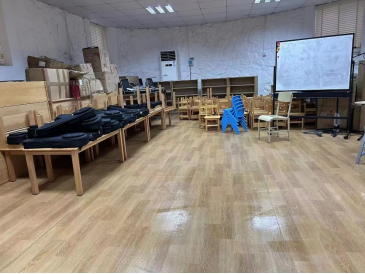Early Childhood Rhythmic Teaching Workshop
Early Childhood Rhythmic Teaching Workshop is mainly an experimental base for combining early childhood psychology, early childhood pedagogy and art education, and is a base for serving the related courses of the preschool education department.
Because of the comprehensive nature of preschool education and the special nature of preschool children's development, preschool education majors in all universities offer theoretical courses for preschool children (such as preschool psychology, preschool health, preschool pedagogy, curriculum theory, etc.) and art courses for preschool children (such as voice, dance, art, handicraft, piano, etc.). These two types of courses are often relatively separate, but the department has long had a very strong specialization in preschool art education, so the Early Childhood Rhythm Lab is a very unique teaching practice base for the department that combines preschool art education with preschool theory education.
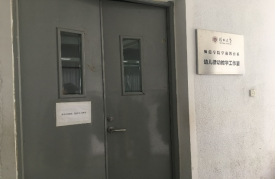
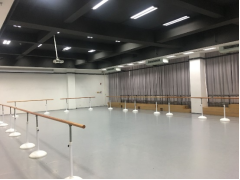
Electronic Piano Classroom
The classroom is equipped with state-of-the-art electronic piano equipment and recording equipment to allow students to perform and record music in real time. Professional music software and teaching resources are also available in the classroom to help students become familiar with all aspects of music instruction.
Students will receive a systematic study of piano teaching and educational theory. They will learn piano performance techniques, music theory, music analysis, and music teaching methods and strategies. They will also have the opportunity to engage in teaching internships and observations to continuously improve their teaching skills through instruction and feedback.
The classroom also offers a wide variety of extracurricular activities and music workshops, giving students the opportunity to participate in recitals, ensembles, music seminars, and other activities that enrich their musical experience and artistic training.
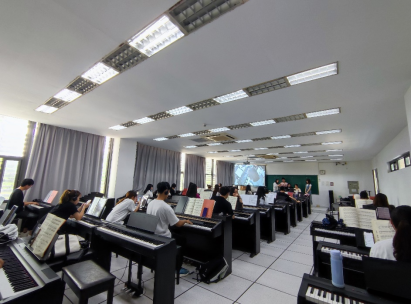
Orff Music Teaching Studio
The Orff Music Teaching Studio provides the equipment and space needed for a more complete Orff music education, allowing students to participate and experience rhythm instrument creation and rhythmic activities as participants themselves. Through rhythm recitation, hand clapping and foot stomping and other human instruments, music games, singing, dancing, painting, acting out small plays, playing Orff instruments and other forms of teaching and research related to music education for preschool children.
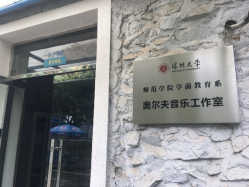
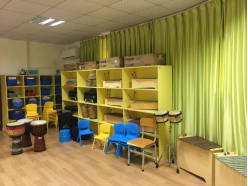
Creative arts and crafts lab for young children
The lab is mainly responsible for teaching basic art courses in preschool education, teaching children's painting and crafting courses, and teaching and researching activities related to children's art education during the semester.
The lab is a place of learning and practice for the training of early childhood education professionals. The lab is designed to help students acquire theoretical and practical skills for teaching creative art to young children and prepare them for their future careers in early childhood education.
The lab is equipped with a variety of art materials and hand tools, such as paints, colored paper, and scissors, for students to conduct creative art and craft activities. Students will learn how to design and organize creative art programs appropriate for young children and develop their imagination, aesthetic skills and artistic expression through art activities.
In the lab, students will work with professional teachers and instructors to practice and observe teaching and learning. They will design and implement creative art lessons, organize craft activities, and observe and assess young children's artistic expression and development through interaction with them.
The Early Childhood Creative Arts and Crafts Lab provides a safe, creative and inspiring learning environment where students can practice and continuously improve their educational and art instructional skills. Through learning and practice in the lab, students will develop into early childhood creative arts educators with the expertise and skills to provide quality arts education experiences for young children.
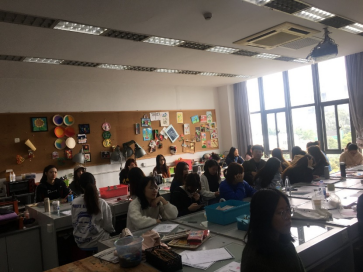
Montessori Children's Home
It mainly undertakes the content of the mandatory undergraduate courses in the five major areas of preschool education, allowing students to master the theory and methods of regional activities and theme teaching in the five major areas in practice. In addition, it also undertakes the course content of professional elective courses, providing a place for students to master kindergarten curriculum design and practice.
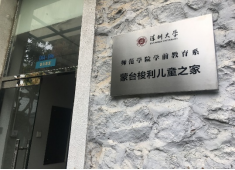
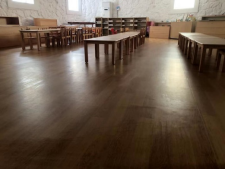
Neuroeducation Laboratory for Preschool Children
The Neuroeducation Laboratory for Preschool Children is an interdisciplinary laboratory that encompasses the disciplines of educational science, neuroscience, brain science and physiology. It is currently the only laboratory in China that specializes in neuroeducation of preschool children. Focusing on the major national needs, aiming at the frontiers of research on preschool children's development, cognition, learning and education, and with neuroeducation as the main research direction, the lab is based on the neural development and assessment of preschool children, the neural basis of preschool children's learning and detection techniques, the cognitive development and assessment of preschool children, the development and assessment of preschool children's critical intelligence, and neuroeducation and inquiry-based science education, etc. We have established a multi-level translational research platform for neuroeducation of preschool children from neurological, physiological, psychological, brain function, brain cognition to behavior, and proposed a series of new technologies and methods applied to the research of neuroeducation of preschool children on this platform to provide empirical research support for child development, basic education reform and innovation capacity cultivation in China.

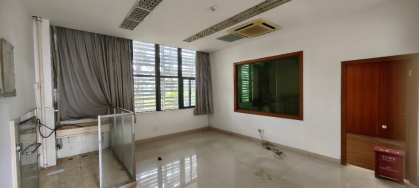
Cognitive Neuroscience Laboratory for Preschool Children
The Cognitive Neuroscience Laboratory for Preschoolers is a laboratory focused on the study of cognitive development and neuroscience in young children. We are committed to exploring in depth the neural mechanisms and cognitive processes in young children's brains to promote the science and optimization of preschool education.
The lab is equipped with advanced neuroscience research equipment, including electroencephalography (EEG) and near-infrared spectroscopic imaging (fNIRS). We use these techniques to study brain activity and cognitive function in young children and its association with cognitive processes such as learning, memory, language, and attention.
In our laboratory, we conduct a series of experimental and observational studies on preschool children, involving perception, memory, language development, and mathematical cognition. We use rigorous experimental designs and data analysis methods to obtain reliable scientific results and to provide a strong scientific basis for early childhood education.
Through our study, we hope to reveal critical periods, developmental trajectories, and individual differences in young children's brain and cognitive development, as well as the effects of external stimuli and educational interventions on young children's cognitive development. This will help optimize teaching methods and early childhood education policies in preschool education and provide a more scientific and personalized learning environment and educational programs for young children.

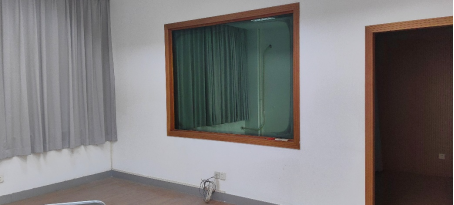
Infant and Toddler Care Contextual Practice Studio
The Infant and Toddler Care Contextual Practice Studio is a venue that focuses on providing hands-on infant and toddler care and training. We are committed to providing real-world infant and toddler care and education experiences for education students and professionals.
In the studio, we simulate real-life infant and toddler care settings and provide a variety of hands-on opportunities where students can learn and apply key caregiving skills, communication skills, and child development theories. We focus on developing students' observation, caring and problem-solving skills.
The studio offers a range of training courses and hands-on programs in areas such as feeding, diaper changing, comforting, child safety and developmental assessment. Our professional instructors will guide students through best practices in infant and toddler care and provide real-time feedback and support.
Our goal is to produce caregivers and educators with the skills and expertise in infant and toddler care who can provide a safe, warm and stimulating environment for infants and toddlers. We emphasize the integration of practice and theory, allowing students to learn and apply what they have learned in real-life situations.
